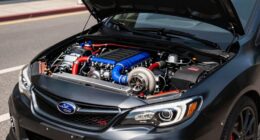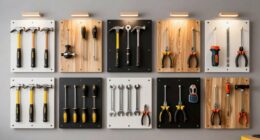To choose the right tuning shop, start by researching online reviews and feedback to gauge reputation and technician expertise. Check their certifications and experience with your vehicle model. Visit the shop to evaluate facilities, cleanliness, and professionalism. Confirm they offer the services you need, like custom calibrations or performance upgrades, and make sure transparent pricing. Prioritize shops that communicate clearly and provide post-tuning support. Digging deeper will help you find a reliable team that meets your vehicle’s unique needs.
Key Takeaways
- Research online reviews, ratings, and customer feedback to assess reputation and satisfaction levels.
- Verify technician certifications, experience, and specialization relevant to your vehicle’s make and tuning needs.
- Inspect the shop’s facilities, cleanliness, diagnostic tools, and staff professionalism for reliability and quality.
- Confirm transparent pricing, clear service breakdowns, and compliance with safety standards and local regulations.
- Choose a shop with comprehensive services, advanced tuning software, and strong post-tuning support for best results.
Conduct Comprehensive Online Research and Gather Feedback

To choose the right tuning shop, you should start by conducting thorough online research and gathering feedback. Begin by reading reviews and ratings on popular review platforms to gauge customer satisfaction and performance. Checking if the shop holds relevant certifications and if its technicians are qualified for your vehicle model is also essential, as this indicates their expertise and adherence to industry standards. Look into how long they’ve been in business, as experience often correlates with reliability. Verify that the shop complies with local regulations, ensuring your modifications are legal. Explore testimonials and feedback from past clients, paying attention to how they handle customer service and resolve complaints. Engage with online forums and communities to hear firsthand experiences from car enthusiasts. This research helps you make an informed decision and find a trustworthy tuning partner for your vehicle. Additionally, reviewing the shop’s service offerings and specific expertise with your vehicle type can further ensure compatibility and quality. Conducting due diligence is a crucial step to avoid potential issues and ensure you receive quality service.
Identify the Shop’s Specializations and Range of Services
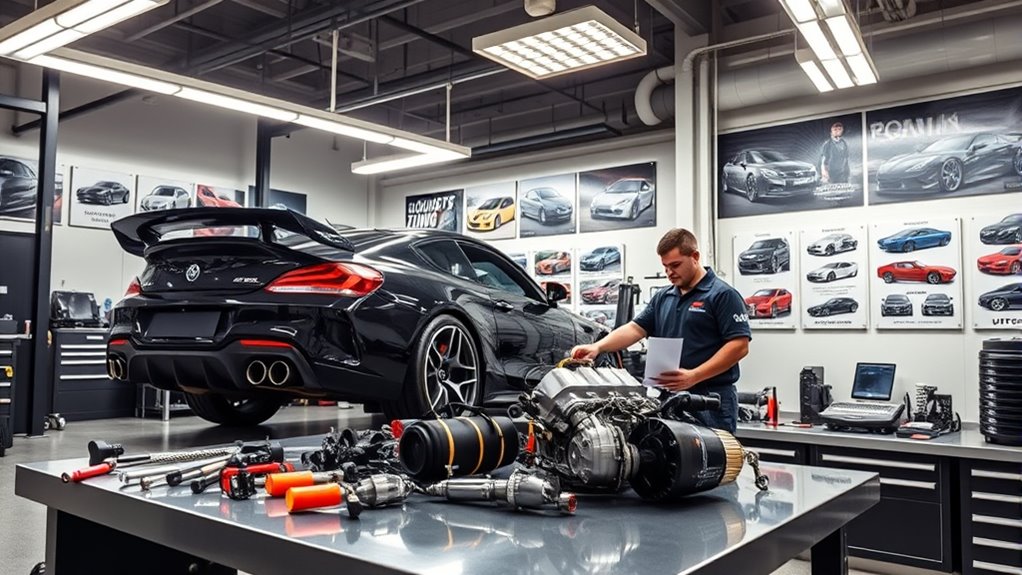
After gathering feedback and reviewing online reviews, it’s important to examine what specific services a tuning shop offers. Look for their areas of focus, such as engine tuning for horsepower boosts or suspension tuning for better handling. Some shops specialize in body and interior modifications, while others focus on transmission adjustments for smoother shifts. Check if they’ve brand-specific expertise, especially for your vehicle make. Also, review their range of services—do they handle performance upgrades like turbo installations, custom calibrations, or accessories? A versatile shop might offer full-service maintenance and repairs alongside tuning. Performance tuning and custom calibrations are often key services that differentiate experienced shops from general repair facilities. Knowing their specialties and service options helps guarantee you find a shop that aligns with your goals, whether it’s raw power, improved handling, or aesthetic upgrades. Additionally, understanding a shop’s brand-specific expertise ensures they have the right tools and knowledge for your particular vehicle model. For example, shops experienced in Mazda Tuning will be more adept at optimizing your Mazda’s performance potential.
Assess the Experience and Certifications of Technicians

Evaluating the experience and certifications of technicians is essential because it directly impacts the quality and reliability of your vehicle’s tuning work. Look for ASE-certified technicians, as their proven expertise covers key systems like engines, brakes, and electrical components. Certification requires passing rigorous exams and recertifying every five years, ensuring skills stay current. Trust and integrity in auto repairs Shops that prioritize certification and ongoing training demonstrate their commitment to honest, high-quality service. Specialized certifications, such as hybrid or EV training, demonstrate familiarity with emerging technologies. Additionally, niche credentials in areas like performance tuning or specific brands highlight advanced capabilities. Confirm these certifications through ASE’s verification database and check recertification dates. Shops that invest in ongoing training and have the right diagnostic tools tend to deliver faster, more accurate work. This reduces errors and boosts your confidence in their skills, especially when combined with industry standards and best practices.
Evaluate the Shop’s Reputation and Customer Satisfaction
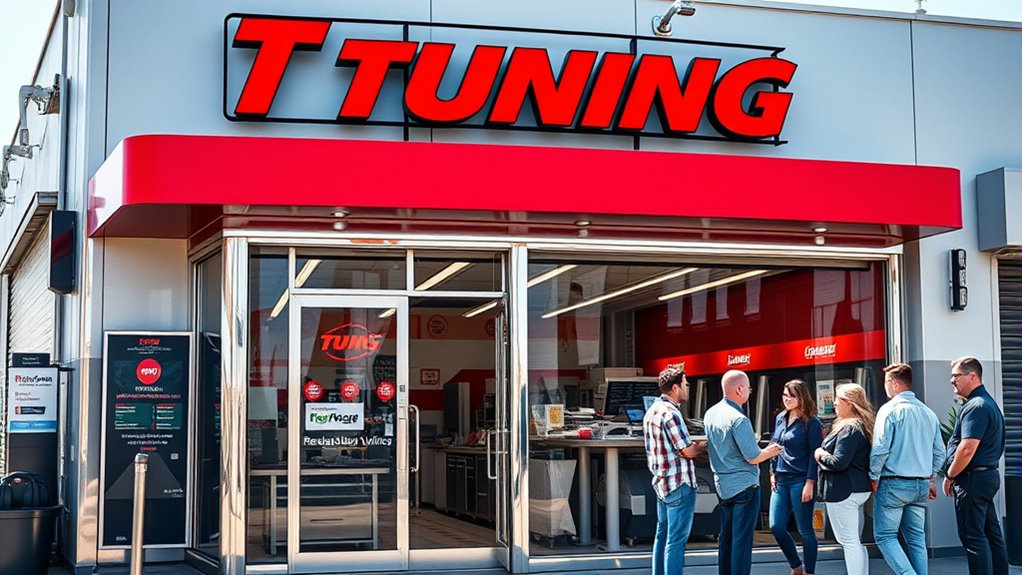
When considering a tuning shop, examining its reputation and customer satisfaction provides valuable insights into its reliability and quality. Check online reviews on platforms like Google, Cars.com, and Edmunds, as nearly 95% of customers read reviews before making a decision. Online reviews influence consumer decision-making, making them a critical factor in selecting a reputable shop. Consistent positive feedback builds trust and credibility. Look for shops that respond promptly to feedback, especially negative reviews, showing they care about customer satisfaction. Use reputation management tools like Shopmonkey to streamline review requests and monitor your shop’s digital presence. A strong reputation for reliability encourages repeat business and referrals. Additionally, a professional website with genuine reviews and active social media engagement can further demonstrate the shop’s commitment to transparency and customer care. Regularly monitoring customer feedback channels and projecting a professional image ensures ongoing quality and satisfaction.
Consider Location, Accessibility, and Convenience Factors
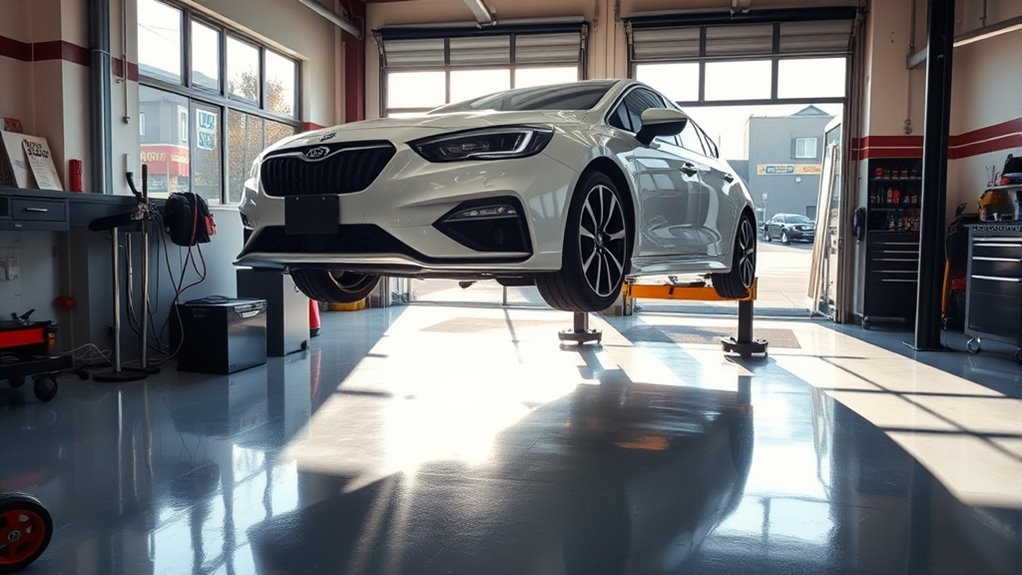
Choosing a tuning shop with the right location, accessibility, and convenience factors can substantially impact your overall experience and satisfaction. Look for a shop in a safe, accessible neighborhood with good visibility and proximity to residential or commercial centers. Researching the shop’s reputation and reviews can help ensure you choose a trusted provider. Avoid oversaturated areas by evaluating local competition and ensuring zoning compliance. Accessibility matters—ample parking, clear signage, and easy street access help prevent frustration. Consider shops near public transportation to make drop-offs easier if you don’t have a private vehicle. Convenience features like comfortable waiting areas, flexible scheduling, and multiple payment options make the process smoother. Finally, ensure the shop has reliable utilities, sufficient space, and adheres to safety standards. Additionally, evaluating vendor reliability can ensure you receive quality service without unexpected issues. Paying attention to service quality can also help guarantee a satisfying tuning experience. The right location and accessibility set the foundation for a positive tuning experience.
Review Pricing Structures and Transparency in Estimates

Understanding the pricing structures and ensuring transparency in estimates are essential steps before committing to a tuning shop. You need clear, detailed info to avoid surprises.
Here are key factors to consider:
- Check if the shop provides itemized estimates, breaking down dyno time, tuner fees, and licenses. This detailed breakdown helps you understand the cost structure and avoid hidden charges.
- Confirm if they use hourly rates (typically $100–$150) or flat-rate pricing (usually $200–$500 for basic tunes).
- Ask about additional fees, like software licenses or extra dyno pulls, to prevent hidden costs.
- Clarify if there’s a minimum charge or if services like diagnostics are billed separately.
Being thorough ensures you understand what you’re paying for and helps you compare shops effectively. Transparent pricing builds trust and saves you money. Clear communication about costs and work scope is crucial for setting proper expectations and ensuring satisfaction.
Visit the Shop to Inspect Facilities and Meet the Team
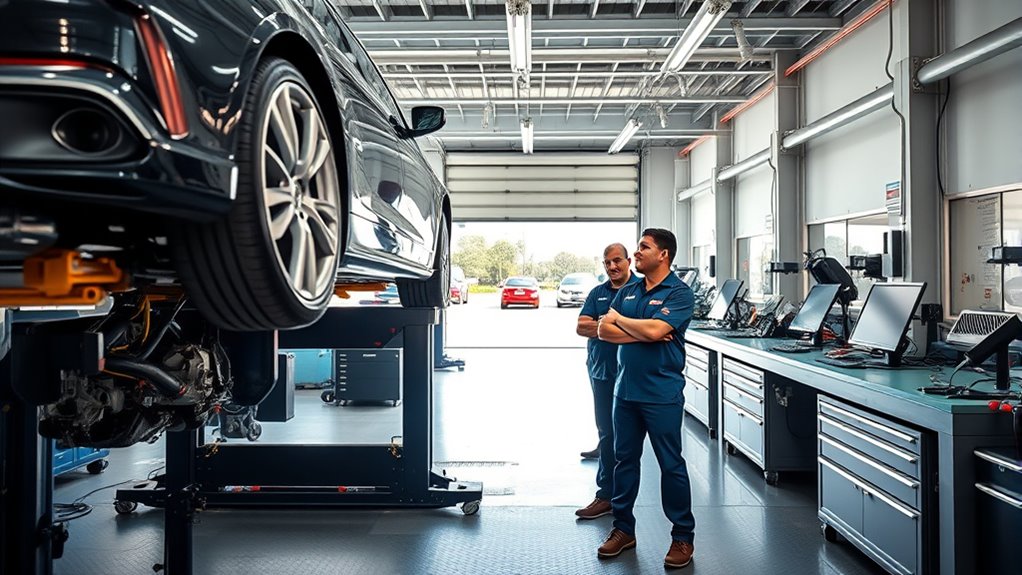
Visiting a tuning shop in person allows you to get a firsthand look at their operations and meet the team behind your vehicle’s customization. Start by evaluating the cleanliness and organization of the workshop—clean floors, labeled tools, and clutter-free work areas reflect professionalism and safety. A thorough inspection of the facility ensures that the shop maintains proper standards, which can impact the quality of the work performed. Check if vehicles are parked in designated zones without overcrowding. Inspect the equipment—modern diagnostic tools, dyno machines, and lifts should be present and well-maintained. Observe how technicians conduct multi-point inspections and testing, using checklists and systematic ratings. Meet the team to verify their credentials, certifications, and communication skills. Notice their willingness to explain processes and answer questions. An engaged, transparent team and a well-organized facility are strong indicators of a reliable tuning shop that values quality and customer satisfaction.
Explore Additional Services and Custom Work Capabilities
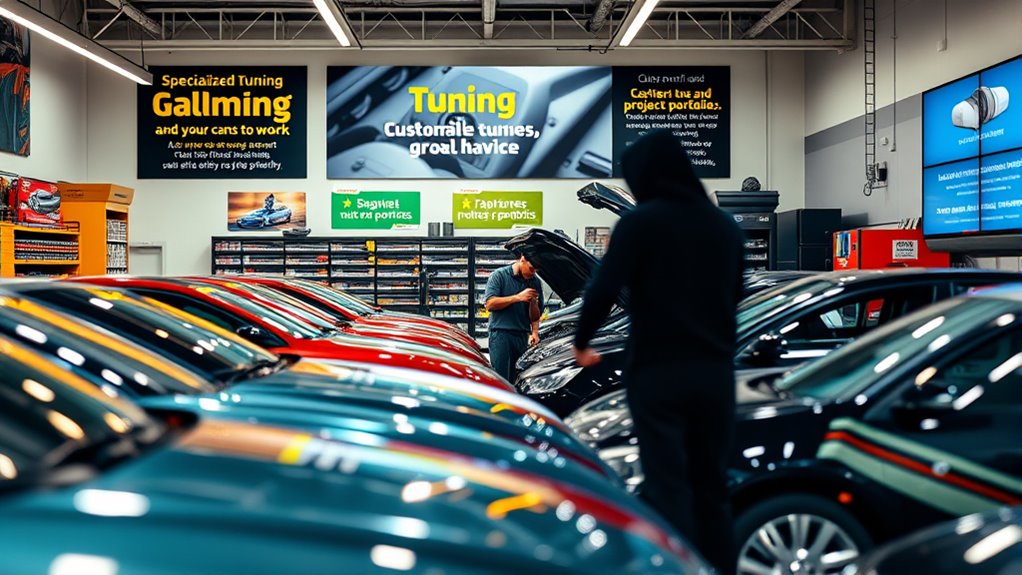
Exploring a tuning shop’s additional services reveals their ability to customize your vehicle beyond basic upgrades. It’s essential to see if they offer advanced modifications tailored to your goals.
For example, they might provide:
- Custom fabrication of aero components like splitters and diffusers for improved aerodynamics.
- Lightweight material integration, such as carbon fiber or aluminum parts, to reduce weight.
- Roll cage installation for enhanced safety and chassis rigidity on track days.
- Interior modifications, including racing seats or harness bars, to boost comfort and safety.
They may also offer *advanced tuning* services such as custom ECU mapping to optimize engine performance for specific driving conditions.
These services demonstrate their expertise in creating personalized solutions that align with your driving style and ambitions. A shop with such capabilities shows they’re committed to delivering *all-encompassing*, high-quality customization beyond simple tuning.
Make an Informed Decision Based on Your Vehicle’s Needs and Budget

When choosing a tuning shop, it’s crucial to evaluate their expertise, reputation, and equipment to guarantee they can meet your vehicle’s specific needs within your budget. Look for shops with experience in your car’s make and model, and verify technician certifications like EFI or AEM. Review their project portfolio and customer feedback on reviews and community reputation. Make certain they use advanced, regularly updated tuning software and diagnostic tools. Good communication is essential—ask for clear explanations, transparent pricing, and post-tuning support. Finally, compare costs and check warranty policies to avoid surprises. Ensure the shop has a track record of successful performance upgrades and satisfied clients. Prioritizing shops that align with your vehicle’s requirements and budget ensures you get reliable, safe tuning that maximizes your investment.
Frequently Asked Questions
How Do I Verify a Tuning Shop’S Industry Certifications or Awards?
You should start by asking the shop for proof of their industry certifications, like ASE, EFI University, or OEM-specific training. Check their awards and recognition from reputable sources such as SEMA or racing series affiliations. Look for features in trade publications or social proof from sponsored builds.
Confirm their participation in recognized training programs and verify their credentials through official documentation or third-party audits to guarantee they’re qualified and reputable.
Can a Tuning Shop Handle My Specific Vehicle Make and Model?
You’ve probably heard that finding the right tuning shop is as essential as a mechanic’s skills, and it’s true! To know if a shop can handle your specific make and model, ask about their experience and success with vehicles like yours.
Check their technicians’ training and certifications. Confirm they’ve the right software and equipment.
Customer reviews and recommendations from fellow owners can also reveal if they’re truly experts in handling your car.
What Warranty or Guarantee Policies Do Tuning Shops Typically Offer?
Tuning shops often offer warranties that cover workmanship and parts for a limited time, usually 30 days to a year. These guarantees protect against installation defects and software failures but typically exclude damage from misuse or further mods.
Check if the shop provides extended warranties or partners with third-party providers. Make sure the policies are clear, written, and align with your vehicle’s warranty to avoid surprises down the road.
How Do I Ensure the Shop’S Custom Work Aligns With My Performance Goals?
Think of your performance goals as a compass guiding your journey. To guarantee the shop’s custom work aligns, clearly communicate your targets—like power gains or responsiveness—and ask how they plan to achieve them.
Confirm they understand your expectations, explain their proposed modifications, and discuss potential limitations. A good shop will tailor their work to meet your goals precisely, keeping you informed every step of the way.
What Are the Best Ways to Confirm a Shop’S Reputation in the Local Car Community?
You want to confirm a shop’s reputation in your local car community. Start by asking fellow enthusiasts or friends for their honest experiences.
Check online forums, social media groups, and local automotive clubs for reviews and discussions.
Attend community events or car meets where you can observe or talk directly with passionate car owners.
These steps help you gauge trustworthiness and quality before making your decision.
Conclusion
Choosing the right tuning shop is like finding a trusted partner for a long journey—you want someone reliable who understands your vehicle’s needs. After doing your homework and visiting a few places, you’ll see which shop feels like a good fit. Think of it as finding the perfect tune-up—once you do, your car will run smoother, and you’ll enjoy the ride even more. Trust your instincts, and you’ll hit the road with confidence.






